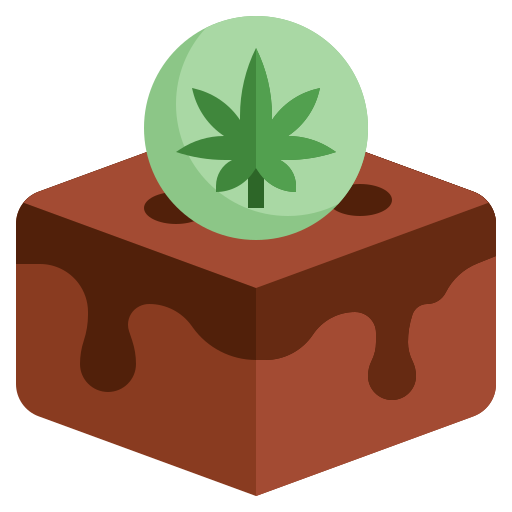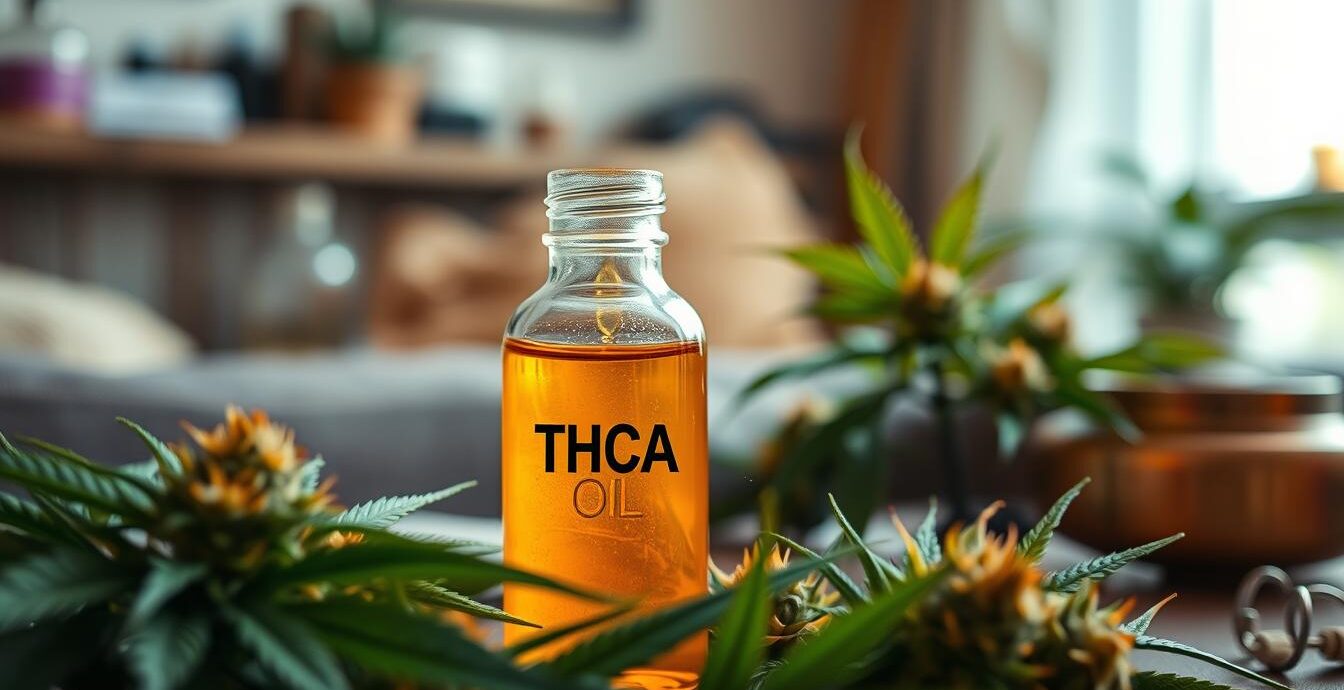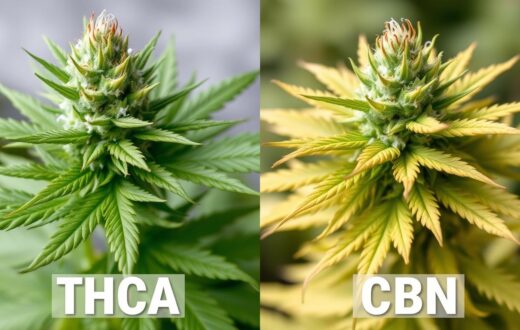Ever thought about the hidden potential of raw cannabis? THCA oil is making waves, offering new insights into cannabis benefits.
THCA oil comes from tetrahydrocannabinolic acid in raw cannabis plants. Unlike THC, it doesn’t get you high when you eat it raw. This has caught the attention of scientists and users.
THCA oil might help with inflammation and protect your brain. It’s legal in many places, making it a popular choice for natural remedies.
Let’s explore how to make THCA oil, its benefits, and how to use it. This guide is for everyone interested in cannabis, whether you’re new or experienced.
Understanding THCA: The Basics
THCA, or tetrahydrocannabinolic acid, is a key compound in raw cannabis plants. It’s the precursor to THC, the well-known psychoactive component. Unlike THC, THCA doesn’t produce a high. This difference stems from its unique chemical structure.
What Does THCA Stand For?
THCA stands for tetrahydrocannabinolic acid. It’s found in fresh cannabis and can make up to 90% of the total THC content. THCA is not created in labs but occurs naturally in cannabis and hemp plants.
How Is THCA Different from THC?
The main difference lies in their effects. THCA doesn’t bind well to brain receptors, so it doesn’t cause psychoactive effects. THC, on the other hand, binds readily to these receptors, leading to the classic cannabis high. The transformation from THCA to THC happens through decarboxylation, typically when cannabis is heated.
The Role of THCA in Cannabis Plants
THCA plays a crucial role in cannabis plants. It’s abundant in fresh plants and serves as a defense mechanism. Recent studies suggest THCA may have anti-inflammatory properties, potentially benefiting conditions like arthritis. Some research even hints at its ability to support brain health. While more studies are needed, THCA’s potential extends beyond its role as a THC precursor. It’s finding its way into various products, from cannabis tinctures to THCA crystals, offering a new avenue for those interested in cannabis benefits without the high.
The Extraction Process of THCA Oil
Creating THCA oil is a detailed process that needs skill and care. Cannabis plants have over 550 chemicals, including more than 100 phytocannabinoids. The quality of the plant material is key to the final product.
How Is THCA Oil Made?
THCA oil is made through different extraction methods. Solvent-based methods like ethanol, butane, and CO2 are used. Solventless methods like ice water hash, dry sift, and rosin pressing are also common. Each method tries to keep the plant’s natural cannabinoids.
Different Extraction Methods Explained
Ethanol extraction is safe and efficient, making high-quality cannabis concentrates. Butane Hash Oil (BHO) can have high THC but needs special equipment. CO2 supercritical extraction is clean and precise.
Solventless methods like ice water hash and rosin pressing are becoming popular. They are known for their purity and simplicity.
Quality Control in Extraction Procedures
Quality control is vital in making THCA oil. It involves testing for contaminants, checking potency, and ensuring consistent cannabinoid profiles. Advanced systems like the CannaTrue™ EPD help remove impurities and improve quality.
These systems ensure the crude oil is of high quality. It can then be refined into potent THCA distillate, reaching up to 99% purity.
Benefits of THCA Oil
THCA oil comes from raw cannabis oil through a special process. It’s found in hemp and cannabis plants. People are excited about its potential health benefits.
Potential Therapeutic Properties
Studies show THCA oil might help with many health issues. It could help you relax, ease physical pain, and boost your mood. Some research suggests it might even help with seizures and nausea.
Anti-Inflammatory Effects
THCA oil is known for its anti-inflammatory properties. This is good news for people with arthritis and inflammatory bowel disease. It could lead to new ways to treat these conditions.
Neuroprotective Qualities
A 2017 study found THCA oil is very good at protecting the brain. This could help with diseases like Parkinson’s and Alzheimer’s. More research is needed, but it’s a promising area of study.
While we need more research, the early results are encouraging. As scientists learn more, we might find even more health benefits from THCA oil.
Uses of THCA Oil
THCA oil is great for everyday use. It’s found in fresh cannabis and doesn’t make you high. Let’s see how you can use it and find the right amount for you.
How to Incorporate THCA Oil into Your Routine
You can mix THCA oil into food or drinks, use it on your skin, or hold it under your tongue. Many like tinctures for easy measuring. But remember, heat changes THCA into THC. So, keep the oil cool to keep its special benefits.
Dosage: Finding What Works for You
Begin with a small amount of THCA oil and slowly add more. Everyone is different, so finding the right amount is key. THCA doesn’t make you feel high like THC does. Keep track of how much you use and how you feel to find your perfect dose.
Different Forms of THCA Oil
There are many ways to get THCA oil. Tinctures are good for exact amounts. Capsules are easy to take, and topicals work on specific areas. Some like raw cannabis juices for THCA. Each type has its own benefits. Choose what fits your needs and likes. Hemp-derived terpenes can also boost the benefits of THCA oil.
Legal Status of THCA Oil in the U.S.
The laws about THCA oil in the U.S. are complex. The 2018 Farm Bill made hemp products with less than 0.3% THC legal. This opened the door for THCA products, leading to a big increase in the market, especially in Texas and Tennessee.
Federal vs State Laws
Federal law says hemp-derived THCA products are okay, but state laws differ. Some states allow THCA products, while others don’t. For example, Florida lets THCA products with less than 0.3% THC, but Georgia only allows it for medical use.
What You Need to Know Before Purchasing
Before buying THCA oil, check your local laws. Look for products with certificates of analysis to make sure they follow hemp laws. Some THCA products might be mislabeled, leading to stronger effects than expected. It’s important to know about full-spectrum cannabinoids and cannabis concentrates and their cannabinoid profiles.
Navigating Legal Gray Areas
The legal status of THCA oil is still changing. The 2018 Farm Bill legalized many hemp products, but a DEA letter said THCA isn’t covered. This creates uncertainty for both consumers and producers. Keeping up with changes in THCA laws is key for safe and legal use.
Common Misconceptions About THCA Oil
THCA oil, made from raw cannabis oil, often leads to confusion. Let’s debunk some myths about this unique compound.
The Psychoactive Myth
Many think THCA oil gets you high like THC. But that’s not right. In its raw form, THCA doesn’t get you high. It only becomes psychoactive when heated, turning into THC.
This confusion comes from the similarity in names between THCA and THC.
Legal Status Confusion
Another myth is that THCA oil is legal everywhere. But the truth is more complicated. The 2018 Farm Bill allows hemp products, but state laws differ.
Some places allow THCA oil, while others don’t. Always check local laws before using it.
Therapeutic Value Doubts
Some doubt THCA oil’s medical benefits. But research shows it might have some. Studies suggest it could have anti-inflammatory and neuroprotective effects.
While more research is needed, early findings are encouraging. They suggest THCA could be useful for health.
Knowing these facts helps separate fact from fiction. It’s important to rely on current research and talk to healthcare experts before using THCA oil. Remember, everyone’s body reacts differently to cannabinoids, so experiences can vary.
Safety Considerations When Using THCA Oil
THCA oil is safe to use, but it’s important to know the risks. It’s key to understand how it works and follow guidelines. We’ll look at the safety of THCA oil, including its effects and how it’s different from cannabis tinctures.
Potential Side Effects
Using THCA oil might cause mild side effects. These can include nausea, stomach discomfort, or skin irritation when applied topically. It’s important to note that THCA doesn’t cause psychoactive effects unless it undergoes decarboxylation, turning it into THC.
Interactions with Other Medications
THCA can interact with certain medications, especially those processed by the liver. If you’re taking any medications, talk to your doctor before using THCA oil. This step is crucial to avoid potential complications.
Guidelines for Safe Use
Start with low doses of THCA oil and gradually increase as needed. Buy from reputable sources to ensure product quality. Store your THCA products properly to prevent accidental decarboxylation. Keep them away from children, just as you would with cannabis tinctures or products containing hemp-derived terpenes.
Remember, while THCA oil shows promise, more research is needed. A study found that 1 in 3 cannabis users in the U.S. have tried edibles, highlighting the growing interest in alternative cannabis products. Always prioritize safety and consult healthcare professionals when in doubt.
The Future of THCA Research
THCA research is moving fast, with scientists looking into its medical uses. They’re finding out how full-spectrum cannabinoids help with inflammation and brain diseases. This interest is also seen in sales, with THCA making up 7.3% of hemp product sales in 2023.
Ongoing Studies and Findings
Researchers are studying THCA’s healing powers. They’re looking at its effects on nausea, inflammation, and brain health. By studying different cannabinoid profiles, they’re learning how THCA works with other cannabis compounds. This research is key for creating better treatments and understanding THCA’s full potential.
Cannabis Experts’ Perspectives
Cannabis experts are hopeful about THCA’s future in medicine. They see its potential in areas where THC might not work. They aim to make safe, effective, and balanced THCA products. They also emphasize the need for thorough third-party testing to ensure quality and potency.
Potential for Medical Advancements
The future of THCA research is bright for medical breakthroughs. As studies continue, we might see new treatments for many conditions. The study of cannabinoid profiles could lead to even better therapies. With the cannabis industry growing, THCA’s role in full-spectrum cannabinoids and concentrates is set to expand, opening up new medical possibilities.
How to Choose Quality THCA Oil
Choosing the right thca oil is important. The way it’s made affects its quality. Here are some tips to help you find the best thca oil.
Indicators of High-Quality Products
Check if the thca oil has lab test results. These tests show if the oil is pure and strong. Look for oils made from organic, non-GMO hemp. The way it’s extracted should keep the good stuff in.
Trusted Brands to Consider
Find brands known for their thca oil. Coastal Green Wellness is a good example. They use growers who follow strict rules. Choose brands that focus on taste, smell, and looks, not just THCa levels.
Reading Product Labels Carefully
Look at the THCa content on the label. Good thca oil has 15% to 20% THCa. See if it has other cannabinoids and extra ingredients. Remember, it must have less than 0.3% Delta 9 THC to be legal.
Cooking with THCA Oil
THCA oil is a great way to spice up your cooking. It’s found in cannabis plants and can make your food taste better and possibly be healthier. Let’s see how you can use THCA oil in your kitchen.
Recipes to Try
Use THCA oil in raw dishes to keep its good stuff intact. Mix it into smoothies, salad dressings, or no-bake treats. But, remember, heat can change THCA into THC. So, cook at temperatures under 350°F to avoid this.
Tips for Infusing THCA Oil
Begin with small amounts of THCA oil because it’s strong. Heat it with a fat base for 2-3 hours to infuse well. If using THCA diamonds, warm them up at 220°F for 30-45 minutes before cooking. Always buy from reliable places like Hemp Generation.
Flavor Profiles and Pairings
THCA oil brings earthy and herbal tastes to your food. It goes great with fresh herbs, citrus, and raw veggies. Try mixing it with cannabis tinctures or hemp terpenes for new flavors. The aim is to mix flavors well and get the most from THCA.
Cooking with THCA oil can make your meals more exciting. It’s perfect for making fancy dishes or just adding something special to your daily food. Just keep your THCA products in a cool, dark spot to keep them fresh.
THCA Oil vs Other Cannabis Oils
Cannabis oils vary in their properties. THCA oil is unique because it doesn’t make you high. This is because it doesn’t bind to brain receptors like THC does.
Comparing Effects and Benefits
THCA oil might help with inflammation and protect the brain. It’s found in raw cannabis and is non-psychoactive. Unlike THC and CBD, THCA could offer benefits in areas where they don’t.
Price Point Differences
THCA oil is pricier than other cannabis oils. The cost reflects the special process to keep THCA raw. THC and CBD oils are cheaper and more common.
User Preferences
Some like THCA oil for its non-intoxicating effects. It lets users enjoy benefits without getting high. Others prefer CBD or THC oils. The choice depends on health goals and legal issues.
Customer Experiences and Testimonials
People using THCA oil have different experiences. Some say it helps with chronic pain and inflammation. Others notice better mood and sleep. The results can vary because of how the oil is made.
Anecdotal Evidence of Effectiveness
Many users of THCA oil share good news. Some say it helps with arthritis and migraines. Others find it eases anxiety. These stories show the oil’s potential, but results can vary.
Varied User Experiences
The effects of THCA oil depend on dosage and body chemistry. Some feel relaxed and pain-free. Others feel more energetic and focused. Remember, THCA oil doesn’t get you high unless heated.
Community Insights and Support
Online forums are great for sharing THCA oil experiences. Users talk about dosages, products, and how to use the oil. These places offer support and info. But, always talk to a doctor before trying new supplements.
Getting Started with THCA Oil
Starting your journey with THCA oil is exciting. This guide will help you understand the basics and succeed. Remember, THCA oil is different from other cannabis tinctures. So, it’s important to handle it with care.
First-Time User Tips
Start with a low dose of THCA oil and increase as needed. Buy from trusted sources and check the product’s potency. Knowing about decarboxylation is crucial. THCA turns to THC when heated, but it happens slower in your body than with traditional cannabis.
Setting Realistic Expectations
THCA oil effects can vary and may take time to show. Unlike THC, it won’t make you feel “high.” Instead, you might notice small mood changes or pain relief. Some users find benefits similar to hemp-derived terpenes, like less inflammation or better sleep.
Tracking Your Progress
Keep a journal to track your THCA oil use, dosage, and effects. This helps you optimize your experience and spot patterns. Note any changes in symptoms or overall health. If you use other cannabis tinctures, compare THCA oil’s effects. Remember, being consistent is key for potential health benefits.
Conclusion: Should You Try THCA Oil?
THCA oil comes from full-spectrum cannabinoids and offers a new way to improve wellness. It’s different from THC because it doesn’t make you feel high. This makes it great for those looking for health benefits without the psychoactive effects.
Weighing the Pros and Cons
THCA oil has many good points. It’s legal if it comes from hemp and has less than 0.3% THC. Studies suggest it might help with inflammation and protect the brain. It’s also easy to get, which is a big plus.
But, there are downsides too. There’s not much research yet, and it could interact with other drugs. It’s important to know both the good and bad before trying THCA oil.
Final Thoughts on Incorporating THCA Oil
Trying THCA oil is a personal choice. You should talk to a doctor first, especially if you’re taking medicine. As we learn more about cannabis, THCA oil might be something you want to try. It’s for those interested in natural health options and are ready to explore.















